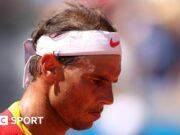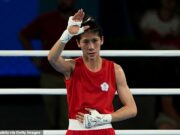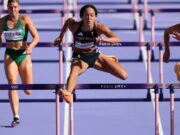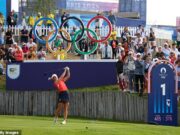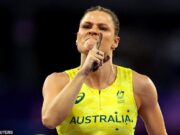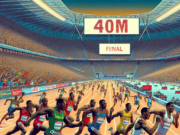A boxer embroiled in the gender eligibility debate surrounding the Paris Olympics etched her name on the canvas of the ring on Saturday and was overcome with emotion after clinching an Olympic medal.
Algeria’s Imane Khelif was filled with joy as she repeatedly struck the ring floor with her hands, following a convincing victory over Hungary’s Anna Luca Hamori in the quarter-final of the 66kg category. After the match, Hamori congratulated Khelif and wished her success for the upcoming rounds. When asked about the surrounding controversy, Hamori stated, “I don’t care.”
At 25 years old, Khelif has secured Algeria’s first boxing medal since 2000, winning the three-round match 5-0 by unanimous decision, with a gold medal now in her sights. She will face Thailand’s Janjaem Suwannapheng in the semi-finals on August 6.
Khelif and Taiwanese competitor Lin Yu-ting have faced significant scrutiny during these Games. Both boxers competed without issues at Tokyo 2020 but were disqualified from last year’s world championships by the International Boxing Association (IBA) for not meeting gender eligibility criteria. The International Olympic Committee (IOC) has raised concerns about the validity of the tests conducted, labeling the disqualifications as “arbitrary,” while IOC President Thomas Bach mentioned that the boxers were subjected to “hate speech.”
On Saturday in Paris, Khelif stepped into the ring to raucous cheers from a large group of Algerian supporters. She controlled the match, yet was emotional as she passed by a throng of international reporters.
Yacine Arab, the sport manager for the Algerian Olympic Committee, explained that Khelif had been without her phone for the past 24 hours to protect her from the surrounding noise. “This controversy is ridiculous,” he asserted. “Everyone knows that Imane was born a girl. She has competed as a girl her entire life. When she was losing, nobody raised these issues.”
Before the match, Khelif’s father expressed that the criticism aimed at her was “immoral” and “unjust.” Amar Khelif told Reuters, “I feel honored to have such a daughter because she is a champion who has brought pride to our family. I encourage her, and I hope she will win a medal in Paris. Imane has loved sports since she was six.”
The IBA, under the leadership of Umar Kremlev, a Russian national funded by the sanctioned company Gazprom, is not managing the Olympic boxing competition after being expelled from the Olympic movement due to failures in reforming judging, refereeing, and governance. Kremlev previously commented that DNA tests had “confirmed they had XY chromosomes, and thus they were excluded.”
However, the gender eligibility status of both boxers remains uncertain. The IOC criticized the IBA for modifying its gender rules during the 2023 world championships, stating it would allow both fighters to compete under the less stringent eligibility rules that were in effect during the Tokyo Games in 2021. The IOC abolished blanket sex testing in 1999.
Prior to the match on Saturday, Bach remarked: “This is not about the transgender issue. This concerns a woman competing in a women’s category. Let me reiterate that this is not a DSD case.”
after newsletter promotion
The IOC later tweeted that Bach intended to clarify that this was not a case involving transgender issues.
“Differences of sex development” (DSD) refers to conditions that manifest early in fetal development where sex differentiation does not follow typical patterns. This was formerly termed “intersex.” The term transgender pertains to individuals whose current gender identity differs from the sex assigned to them at birth.
In advance of Saturday’s match, the Hungarian Boxing Association announced it lodged a protest with the International Olympic Committee and was contemplating a potential legal challenge against Khelif’s participation in the Games.
After the match, Hungarian Olympic Committee member Balázs Fürjes adopted a more conciliatory tone. “As loyal members of the International Olympic family, we have complete faith that the International Committee will make the appropriate decisions,” he stated, though he did not specify what a “correct” decision would entail.







